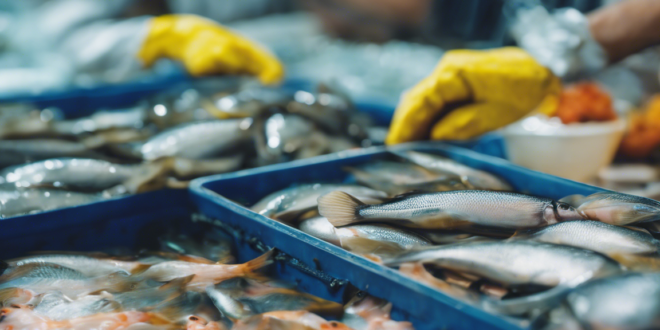Sustainable Feed and Nutrition: Revolutionizing the Aquaculture Market
The global aquaculture industry is undergoing a transformative journey, with sustainable feed and nutrition emerging as critical components for future growth and environmental responsibility. As global seafood demand continues to rise, innovative solutions in aquaculture nutrition are becoming increasingly vital for addressing food security, environmental challenges, and economic sustainability.
The Current Landscape of Aquaculture Feed and Nutrition
Aquaculture has rapidly evolved from a niche agricultural sector to a critical global food production system. With wild-caught fisheries reaching their maximum sustainable yield, fish farming has become the primary solution to meet the world’s growing protein demands. However, the industry faces significant challenges in developing nutritionally balanced, environmentally friendly, and economically viable feed solutions.
Key Drivers of Sustainable Aquaculture Nutrition
Several crucial factors are propelling innovation in aquaculture feed and nutrition:
1. Environmental Sustainability
The traditional reliance on marine-derived ingredients has put enormous pressure on global fish stocks. Sustainable feed solutions now focus on alternative protein sources that reduce environmental impact while maintaining nutritional quality.
2. Economic Efficiency
Feed costs represent up to 50-70% of aquaculture production expenses. Developing cost-effective, nutritionally optimized feed is essential for industry profitability and growth.
3. Nutritional Optimization
Advanced research is enabling more precise nutritional formulations that enhance fish growth, health, and disease resistance while minimizing environmental footprint.
Innovative Protein Alternatives in Aquaculture Feed
The search for sustainable protein sources has led to groundbreaking developments:
– Insect-based proteins
– Algae and microalgae concentrates
– Plant-based protein isolates
– Single-cell protein technologies
– Synthetic amino acid formulations
These alternatives are progressively replacing traditional fish meal and fish oil, offering more sustainable and potentially more cost-effective nutritional solutions.
Technological Advancements in Feed Formulation
Cutting-edge technologies are revolutionizing aquaculture nutrition:
1. Precision Nutrition
Advanced analytical tools and artificial intelligence enable highly customized feed formulations tailored to specific fish species, growth stages, and environmental conditions.
2. Microbiome Management
Researchers are developing feed supplements that support beneficial gut microorganisms, enhancing fish health and reducing the need for antibiotics.
3. Genetic Optimization
Emerging biotechnological approaches are creating genetically enhanced feed ingredients with improved nutritional profiles and digestibility.
Environmental and Economic Impact
Sustainable feed solutions offer multiple benefits:
– Reduced marine ecosystem pressure
– Lower carbon footprint
– Improved fish health and growth performance
– Enhanced food security
– Economic resilience for aquaculture producers
By investing in innovative nutrition strategies, the industry can simultaneously address environmental concerns and economic challenges.
Market Trends and Future Projections
The global aquaculture feed market is projected to experience significant growth, with experts anticipating a compound annual growth rate (CAGR) of approximately 4.5% between 2023 and 2030. North America is expected to be a key market, driven by technological innovation, increasing seafood consumption, and strong research infrastructure.
Challenges and Opportunities
While the sustainable aquaculture nutrition sector shows immense promise, several challenges remain:
– High research and development costs
– Regulatory complexities
– Consumer acceptance of alternative protein sources
– Scaling up innovative technologies
However, these challenges also represent significant opportunities for innovation, investment, and market differentiation.
Conclusion: A Sustainable Future for Aquaculture
The future of aquaculture nutrition lies in holistic, interdisciplinary approaches that balance environmental responsibility, nutritional effectiveness, and economic viability. By continuing to invest in research, technology, and sustainable practices, the industry can develop feed solutions that support global food security while protecting marine ecosystems.
Call to Action
Stakeholders across the aquaculture value chain – researchers, producers, investors, and policymakers – must collaborate to accelerate the development and adoption of sustainable feed technologies. The time for transformative action is now.
 Good Calories Guide GoodCalories Guide focuses on nutrition, healthy eating, and overall wellness. The site offers practical insights into evidence-based dietary practices, including tips for specific lifestyles such as veganism, keto, and family-friendly meal planning. It also addresses unique nutritional needs for individuals with conditions like diabetes or food allergies, while providing quick and accessible recipes to make healthy living a sustainable and enjoyable choice.
Good Calories Guide GoodCalories Guide focuses on nutrition, healthy eating, and overall wellness. The site offers practical insights into evidence-based dietary practices, including tips for specific lifestyles such as veganism, keto, and family-friendly meal planning. It also addresses unique nutritional needs for individuals with conditions like diabetes or food allergies, while providing quick and accessible recipes to make healthy living a sustainable and enjoyable choice.


